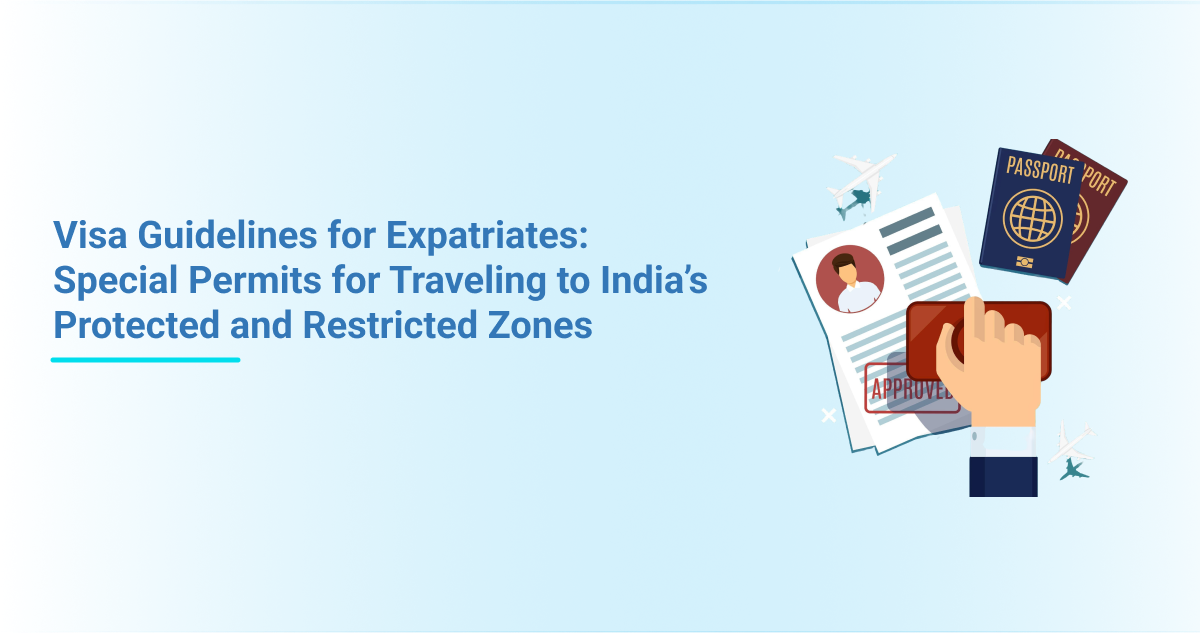Visa Guidelines for Expatriates: Special Permits for Travelling to India’s Protected and Restricted Zones

As global businesses expand their operations into India, they deploy top talent to manage critical business activities, from overseeing projects to building strategic partnerships. However, both expatriates and the companies sponsoring their visas must remain aware of local regulations. A recent case involving Chinese smartphone maker Vivo highlighted the serious consequences of visa non-compliance in India. Several Chinese nationals entered the country on business visas without disclosing their employment with Vivo, and some employees violated visa conditions by traveling to sensitive regions like Jammu & Kashmir and Ladakh without securing the required permits for these Protected Areas.
If expatriates inadvertently enter these sensitive zones without the correct documentation, it can result in visa violations, legal consequences, and reputational damage for both the expatriates and the companies sponsoring their visas. Certain regions in India—classified as Protected and Restricted Areas—mandate special permits for entry. For instance, Northeastern India, positioned as a gateway to Southeast Asia, has attracted significant investment, including recent Japanese-led infrastructure projects aimed at enhancing regional connectivity. However, the area faces increased immigration scrutiny due to its proximity to international borders and its classification as Protected or Restricted Areas.
This article highlights these sensitive regions and provides a detailed guide on the procedure for obtaining the necessary permits required for visiting them.
Summary
Understanding Protected and Restricted Areas
India’s Protected and Restricted Areas are strategically sensitive regions that require foreign nationals to obtain special permits due to national security and local or cultural sensitivities. These areas, often located near international borders or in culturally significant regions, are governed by strict regulations to control access.
Protected Areas require a Protected Area Permit (PAP) for entry, as they are located between the Inner Line and India’s international borders. Restricted Areas require a Restricted Area Permit (RAP) and are governed by the Foreigners (Restricted Areas) Order, 1963. The table below outlines these sensitive areas:

Tourism and Non-Tourist Visits: Permit Requirements
To promote tourism in specific regions, some Protected and Restricted Areas are open to foreign tourists under certain conditions. Foreign nationals can visit these areas as part of a group, as a couple, or individually, provided they obtain a Special Permit from the designated authorities. However, this is limited to areas notified by the government, and strict adherence to permitted routes and entry points is required.
For non-tourist visits, such as business, employment, or studies, expatriates holding visas other than a Tourist Visa must secure prior permission from the Ministry of Home Affairs (MHA) before being granted a Protected Area Permit (PAP) or Restricted Area Permit (RAP). The specific purpose of the visit must be endorsed on the expatriate’s passport, ensuring compliance with the designated purpose.
It’s important to note that even if a foreign national holds a non-tourist visa, such as a Business or Employment Visa, they can still apply for a Special Permit if they wish to visit a Protected or Restricted Area for tourism purposes, provided the area is open for tourism.
Example: A foreign expatriate on a Employment Visa who wishes to visit the Andaman & Nicobar Islands for leisure must still apply for a Special Permit specifically for tourism, even though they already hold a valid visa for employment purposes.
Additional Compliance Requirements
- Special Nationality Restrictions: Citizens of Afghanistan, China, and Pakistan must obtain additional clearance from the MHA before visiting Protected or Restricted Areas.
- Mandatory Registration: All foreign nationals must register with the Foreigners Registration Officer (FRO)within 24 hours of arriving in the designated area.
- Accommodation Provider Reporting: Guest houses, hotels, or hosts must notify local authorities within 24 hours of the foreign national’s arrival and departure.
Read more about Form C here.
- Designated Entry/Exit Points: Travel into these areas must occur through approved routes, such as designated airports or national highways. In the Northeastern states, for example, entry is restricted to specific airports like Guwahati, Aizawl, Imphal, and Kohima.
- Permit Expiry: Expatriates must exit Protected or Restricted Areas before their permit expires. Failure to comply may result in legal consequences.
Procedure for Obtaining Permits
A. For Foreigners Outside India
Foreign nationals planning to visit these areas can submit their applications for the PAP/RAP to the Indian Mission in their home country along with their visa application before traveling to India.
B. For Foreigners Already in India
If foreigners are already in India and wish to visit a Protected or Restricted Area, they should apply for the PAP/RAP through jurisdictional Foreigners Regional Registration Offices (FRROs). It is recommended that these applications be submitted at least eight weeks prior to the intended date of visit.
Compliance and Risk Mitigation for Companies
For companies seconding expatriates to India, understanding and adhering to visa regulations is crucial, especially when expatriates travel locally, whether for work or leisure. Instances like those involving Chinese expatriates underscore the importance of being vigilant. Even unintentional non-compliance can lead to legal consequences, penalties, deportation, future visa denials, and significant reputational damage for both the expatriate and the sponsoring company.
By proactively guiding expatriates on visa regulations, organising compliance counselling sessions, and ensuring that all necessary permits are obtained, companies can significantly mitigate these risks and remain focused on achieving their business goals in India.
Learn more about the common pitfalls companies face when applying for work visas in India
At Expat Orbit, we help companies manage expatriate secondments to India with ease and compliance. For expert guidance on visa requirements and for organising a compliance session with your expatriates in India, connect with our mobility experts

